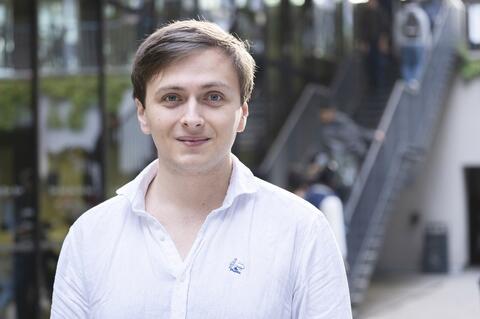
Baptiste Reig
Medical student and entrepreneur
We're working on a contact lens that aims to improve the quality of life for people with AMD.
Baptiste Reig, a medical student explains his entrepreneurial journey and his promising project to improve the lives of patients with age-related macular degeneration. Discover his inspiring story.
What is your background and what medical specialty are you working toward?
Baptiste Reig: I'm currently in my fifth year of medical school, and my choice of study came naturally to me because of my desire to help others and contribute to improving patients' health. As for my future specialty, I plan to specialize in ophthalmology or internal medicine. I'm currently preparing for the national competitive examination.
How did you decide to embark on your entrepreneurial adventure, and how did your project come about?
B. R.: It all started at the Innovation Days for Health in 2021. At this event, we were introduced to multidisciplinary team research on the theme of innovation in diagnostics by and for the eye. Our group was made up of ten students from medicine, management, immunology and other fields. We were awarded the jury's special prize and the distinction "worth continuing". It was at this point that my colleague Kamil Chahine and I decided to develop our idea further.
What is the aim of your project and what are the stakes?
B. R.: We're working on the development of a contact lens designed to improve the quality of life of people suffering from age-related macular degeneration (AMD), a condition for which there is currently no cure.
AMD currently affects 8% of the French population, and could affect one in four people in Europe by 2050. The disease causes irreversible optical deformities and in its advanced forms, the formation of a central scotoma (black spot in the center of vision). There are two forms of AMD: the exudative form, which develops rapidly with neovessels that can be stabilized, and the other form, which progresses slowly and for which there is no treatment.
Who are you working with on this project?
B. R. : I'm working with Kamil Chahine, a former student in the Master's program in translational immunology and biotherapy at Sorbonne University. We met at Innovation Days. We were keen to pursue the project we'd developed at the event, and quickly realized that we were complementary. I was more focused on global operations, while he was devoted to fundamental research. This synergy was crucial to our project.
How far along are you in developing your project?
B. R. : The first six months of the project were spent reviewing the scientific basis of our idea and showing that it was theoretically feasible. We developed a proof of concept that was solid enough to enable us to secure investment and work with Sorbonne University and the Satt Lutech. We had the opportunity to meet representatives from Essilor, Streetlab and the Vision Institute, who showed an interest in our project. They encouraged us to protect our idea by collaborating with Sorbonne University's Research and Innovation Department (DRI). We also submitted our project to the Satt Lutech in September 2022, which was accepted last December. We have also obtained the national status of student entrepreneur (SNEE).
What are the next steps?
B. R.: We are currently working with Sorbonne University, Satt Lutech and a patent firm to protect the idea. The next steps will be to develop a first concrete device, followed by clinical trials to verify its safety and efficacy.
What support have you received from Sorbonne University and the Pépite*?
B. R.: My schedule meant I didn't have enough time to do the D2E (Diplôme d'étudiant entrepreneur). So I opted for the student entrepreneur status, which gives me support and guidance from the Pépite team without having to take all the courses. I attended workshops on the different types of business and on market research. This gave us the basics we needed to get started.
Pépite also put us in touch with Sorbonne University's DRI, who helped us protect our idea. They also provided us with legal support from their experts. Sorbonne University also put us in touch with the Satt Lutech to obtain advice on the patentability of our project and its market potential.
How did you manage to reconcile your medical studies with this start-up project?
B. R.: It's a delicate balance, but I manage to maintain it. My mornings are devoted to my medical internships, while most of my afternoons are free. Courses are generally available online, so I can follow them at my own pace. I also have few compulsory workshops, which allows me to reconcile meetings and project-related tasks with revisions.
What advice would you give to other students who want to try their hand at entrepreneurship?
B. R.: Most start-ups fail because of human problems, not because of ideas or money. In my opinion, the most important thing is to find partners with whom you can work well. Running an entrepreneurial project isn't always easy. There can be many obstacles. Working as a team with people you trust is essential to overcoming these challenges. It's important to persevere and not give up when you encounter a difficulty. Our project encountered them at every stage, but we managed to make progress by remaining determined.
*Pépite: the student entrepreneurial center at Sorbonne University
